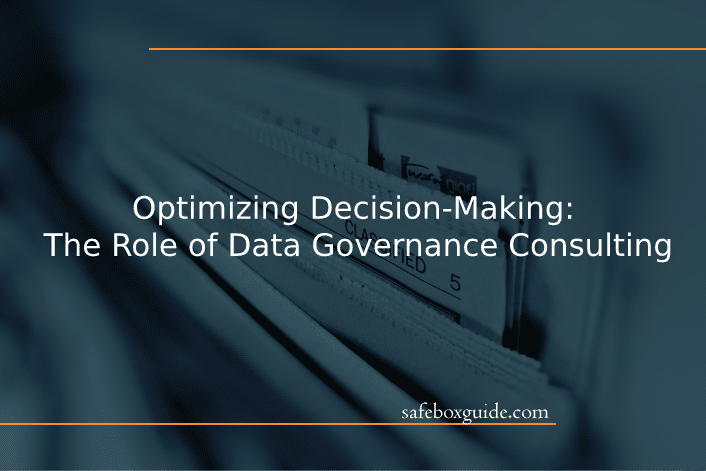Businesses are overrun with large volumes of information from several sources in today’s data-driven environment. Making educated judgments and being able to glean useful insights from this data has become a competitive advantage. The issue of guaranteeing data’s quality, security, and regulatory compliance, however, arises with the amount of data. When enterprises need assistance navigating the complicated world of data management, data governance consulting services may help. Today, we’ll examine the crucial role that data governance consultancy plays in enhancing decision-making, stress the significance of data privacy in relation to data governance, and discuss the advantages of putting effective data governance processes in place.
Contents
Understanding the Role of Data Governance Consulting Firms
Data governance consulting firms are specialists in designing and implementing strategies, processes, and technologies that govern an organization’s data assets. They are essential in directing firms toward efficient data management techniques that support their objectives and conform to regulatory standards. These professionals bring a lot of experience to the table and share insights they’ve gathered from dealing with a variety of clients in different industries.
Businesses and data governance consulting providers work together to create elaborate data governance frameworks. Data standards, roles, responsibilities, and frameworks are all included. Organizations are able to use data as a strategic advantage rather than a liability by leveraging data governance consulting services’ clear roadmaps. They support the elimination of data silos, improve data quality, guarantee compliance, and provide the groundwork for improved decision-making.

Data Privacy with Data Governance: A Crucial Intersection
In an age marked by high-profile data breaches and increasing concerns about privacy, data governance takes on an even more significant role. Data privacy with data governance are intertwined, with the latter serving as a means to protect and manage sensitive information. Data governance consulting firms play a critical role in ensuring that businesses can navigate data privacy regulations while still harnessing the power of their data.
Organizations must adhere to tight guidelines for handling and protecting personal data under privacy laws like the General Data Protection Regulation (GDPR) and the California Consumer Privacy Act (CCPA). Businesses may design plans to protect client information, apply data anonymization techniques, and set up reliable consent management systems with the help of data governance consulting companies. Businesses may increase consumer trust and prevent expensive legal repercussions by integrating data privacy into their data governance architecture.

Benefits of Data Governance for Optimized Decision-Making
Implementing effective data governance practices offers numerous benefits, ultimately contributing to optimized decision-making and organizational success. Let’s explore some key benefits of data governance on optimizing decision-making:
1. Enhanced Data Quality:
Data governance guarantees that data is trustworthy, accurate, and consistent. Clean, high-quality data facilitates more accurate analysis, which in turn improves decision-making.
2. Increased Data Accessibility:
Roles and duties for data ownership and stewardship are clearly established by a well-defined data governance structure. With the relevant information available when they need it, decision-makers are empowered by this accessibility.
3. Cross-Functional Collaboration:
By encouraging communication amongst various divisions, data governance consulting companies assist in destroying data silos. Decision-makers can gain from a holistic viewpoint when data is available to and understood by diverse teams.
4. Informed Strategic Planning:
Decision-makers should have access to historical data, trends, and insights thanks to effective data governance. For strategic planning and predicting market movements, this data is essential.
5. Mitigate Risks:
Data breaches and compliance violations can cause significant financial losses as well as damage to one’s image. Consulting companies for data governance help businesses establish security measures to lower the risk of data breaches.
6. Efficient Regulatory Compliance:
Regulations governing data privacy may be quite complicated. By developing procedures for data processing, retention, and consent management, data governance consulting services assist organizations in maintaining compliance.
7. Swift Decision-Making:
Decision-makers can act swiftly and decisively when they have access to structured, trustworthy data, providing the business a competitive edge.
8. Adaptability and Agility:
It’s crucial to be able to adjust to shifting market conditions. Consulting firms for data governance provide frameworks that adapt to changing data requirements, guaranteeing flexibility and agility.
Choosing the Right Data Governance Consulting Firm
Several considerations must be made when thinking about a cooperation with a data governance consulting organization. Seek out companies with a track record of effective implementations in a variety of sectors. Their background in data privacy and compliance should demonstrate their familiarity with the legal system. Given that your organization’s demands are distinct, a customized strategy is essential. Make sure the consulting company is capable of creating a data governance structure that is in line with your corporate goals.
Data governance consulting firms play an indispensable role in optimizing decision-making within organizations. Because of their knowledge, firms can create strong data governance frameworks that improve data quality, guarantee privacy laws are followed, and encourage cross-functional cooperation. Data governance has several advantages, including better data accessibility, wise strategic planning, and effective compliance. Working with a data governance consulting firm is becoming increasingly important for organizations as they struggle to manage and use data efficiently. Doing so is necessary for them to succeed in the current business environment.

